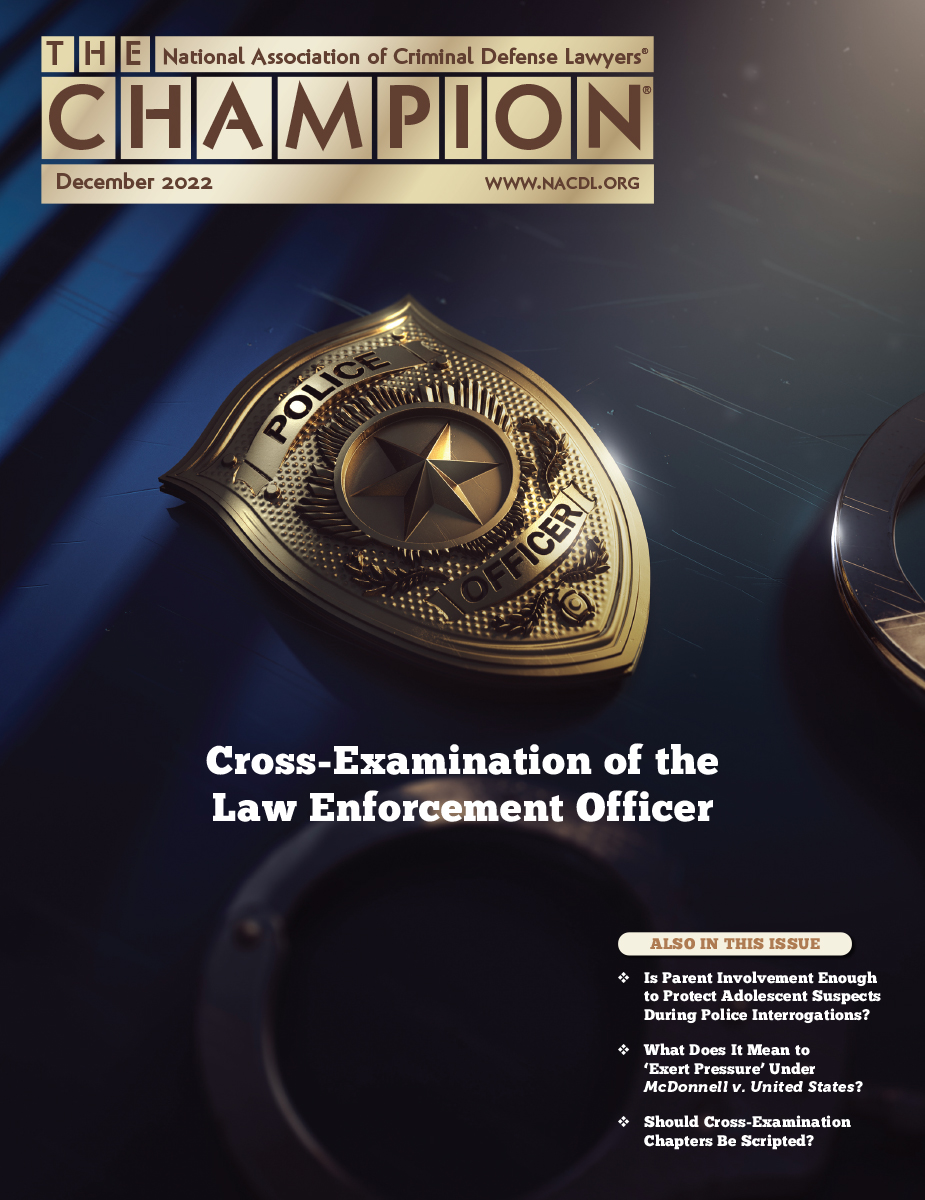December 2022

Mary Stillinger provides examples to show how defense lawyers can put the heat on a law enforcement officer witness to get the information they need.
Articles in this Issue
-
10 Reasons Why Parent Involvement Is Not Enough to Protect Adolescent Suspects
During Custodial Police Interrogations
Some states have proposed or passed legislation that would permit or require parents to have greater involvement in custodial police interrogations of their children. When the police interrogate adolescent suspects, can parents play a protective role in the interrogation room? Will they? Professor Hayley M.D. Cleary discusses 10 reasons parent involvement policies, while well intentioned, can have dangerous unintended consequences for the youth they are designed to protect.
-
Affiliate News
What events are NACDL affiliates hosting this month? Find out here.
-
Book Review: Barred Barred: Why the Innocent Can’t Get Out of Prison by Daniel S. Medwed
This month Lara Bazelon reviews Barred: Why the Innocent Can’t Get Out of Prison by Daniel S. Medwed.
-
Book Review: Trial Lawyer: A Life Representing People Against Power by Richard Zitrin
This month Susan Elizabeth Reese reviews Trial Lawyer: A Life Representing People Against Power by Richard Zitrin.
-
Book Review: When Innocence Is Not Enough by Thomas L. Dybdahl
This month Maneka Sinha reviews When Innocence Is Not Enough: Hidden Evidence and the Failed Promise of the Brady Rule by Thomas L. Dybdahl.
-
From the President: Courts Must Uphold Dignity and Impartiality, Not Tolerate Threats
to Public Defenders
Nellie L. King writes about a case of apparent judicial indifference to threats against public defenders and their children that occurred during the sentencing phase of a case.
-
Getting Scholarship Into Court Project
The “Getting Scholarship Into Court Project” brings helpful law review articles and other writings to the attention of criminal defense attorneys. The project’s purpose is to identify scholarship that will be especially useful to courts and practitioners. Summarized on this page are articles the project’s advisory board recommends that practicing lawyers take the time to read. To recommend articles for this column, contact Professor Jenny Carroll (jcarroll@law.ua.edu).
-
How to Put the Heat on the Heat: Cross-Examination of the Law Enforcement Officer
Defense counsel can put the heat on a law enforcement officer witness through a persistent and thorough examination. What will intimidate the officer most is being questioned about how he did his job. A careful examination of the officer’s conduct can soften the law enforcement witness into giving defense counsel details she never imagined she could get, or it can make the officer hostile and show him to be unprofessional and prejudiced against the client. Defense attorney Mary Stillinger includes examples from real cases to illustrate.
-
Pozner on Cross: Why Script Chapters?
Some lawyers refuse to write their cross-examinations because they believe written crosses will stifle their creativity. Larry Pozner disagrees. “We win most of our cases through crosses we planned, not crosses we lucked into,” he says. “And a scripted chapter frees our mind to listen more closely to the answers and judge when an answer has provided a launching pad for additional areas of cross.” Pozner has yet to hear a valid reason chapters of cross should not be written.
-
Practice Points: Who Says Defense Counsel Can’t Cite the Justice Manual Against the Government?
Many lawyers believe that they cannot cite helpful provisions of the Justice Manual in support of their argument and against the government. It is true that courts invariably hold that Department of Justice guidelines and policies do not create enforceable rights, but nothing prevents lawyers from arguing that relevant provisions of the Justice Manual are persuasive authority.
-
The One-Man Grand Jury: A Star Chamber Comeback
Defense attorney Harold Gurewitz discusses Michigan’s use of a so-called one-man grand jury.
-
We, the Jury: Jurors Conducted an Experiment During Deliberations
but Was It a Constitutional Violation?
Jurors conducted an experiment using extrinsic evidence. No harm, no foul?
-
What Does It Mean to ‘Exert Pressure’ Under McDonnell?
McDonnell v. United States provided a small dose of clarity to the issue of “official acts” under federal anti-bribery law, but confusion remains regarding some issues, such as what it means to “exert pressure.” The ambiguity left in McDonnell’s wake means that criminal defense lawyers will be responsible for waging the fight to clarify the boundaries of corruption prosecutions.
